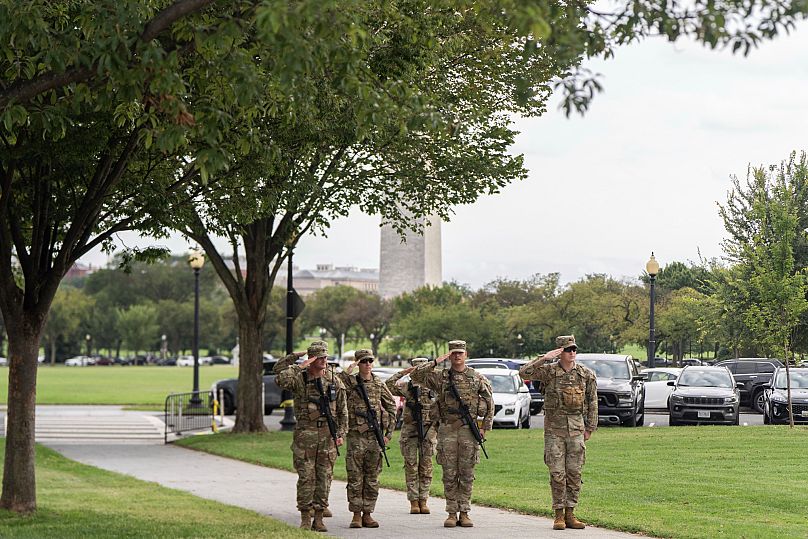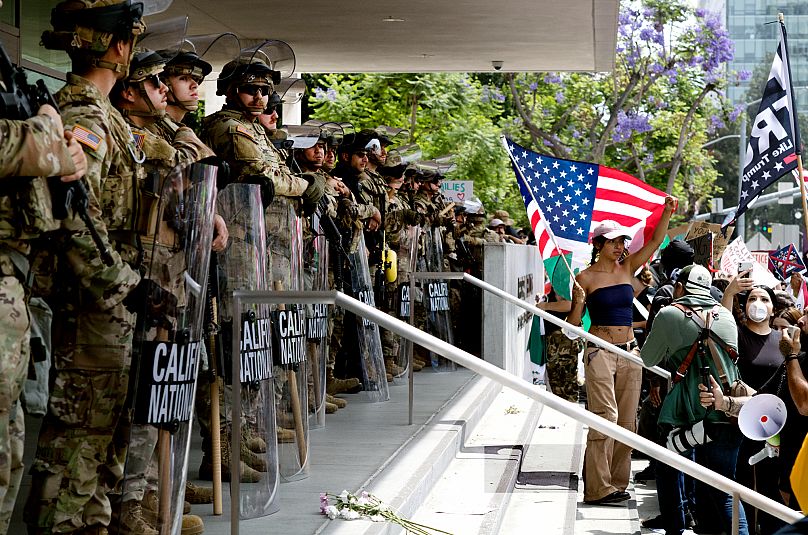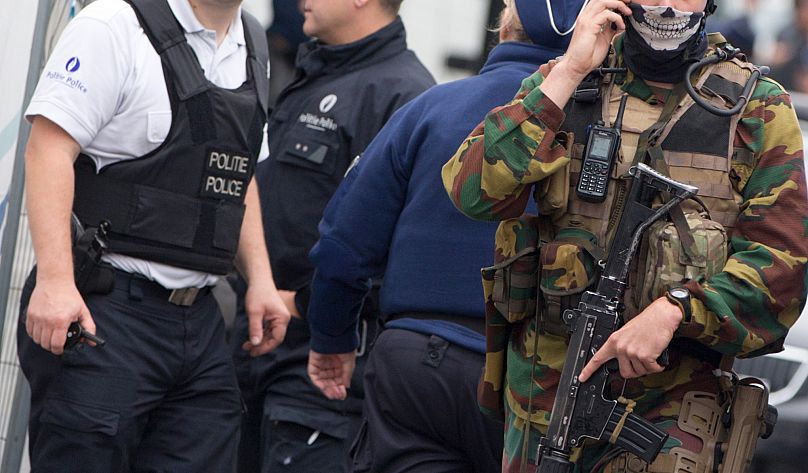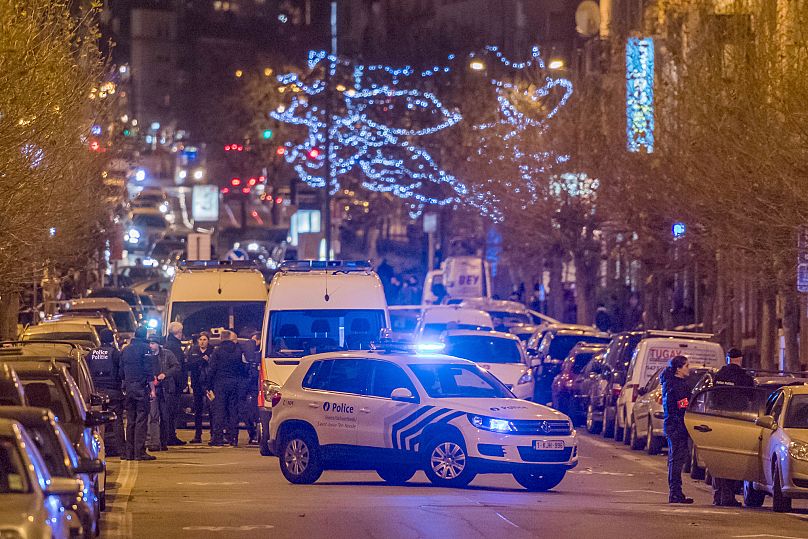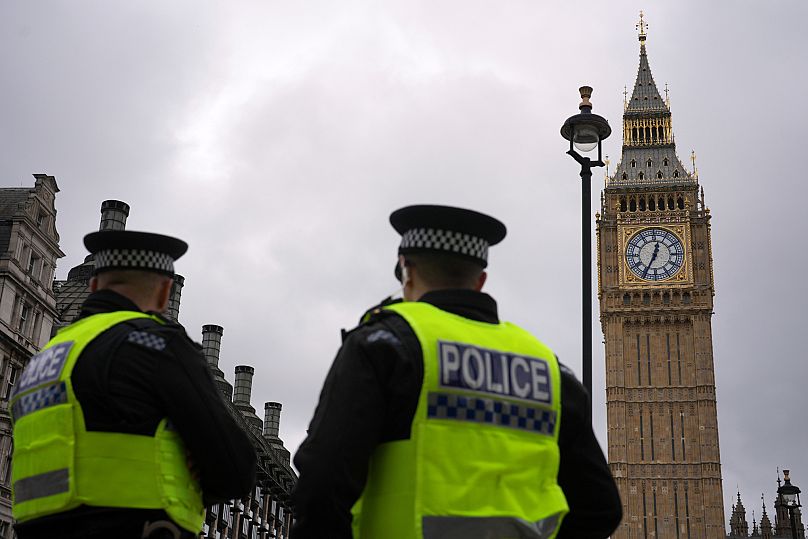In US and Europe, troops in the streets of capital cities tell a different story
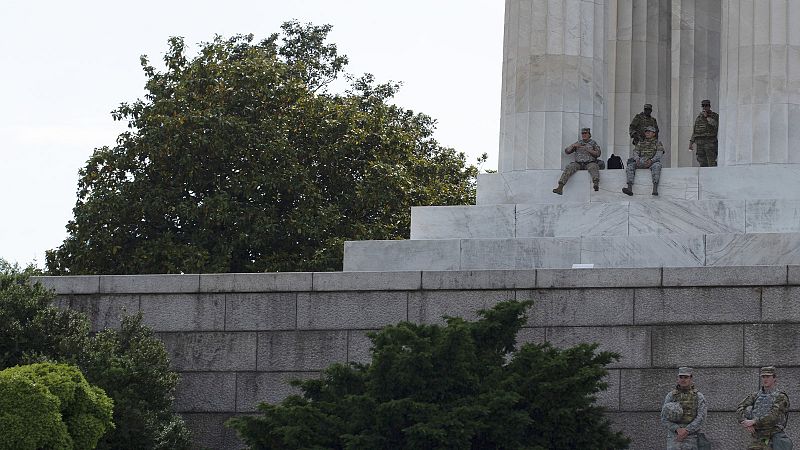
Walking down the famous National Mall in the US capital Washington, it is quite easy to spot different groups of reserve military units dotted around.
The presence of the US National Guard — a state-based military reserve force that can be called up to serve together when on federal missions — is indeed hard to miss.
Some 2,200 armed personnel, mostly sent in from six states, are stationed around Washington’s many metro stations and public sites.
At first glance, their presence does not seem dissimilar from that of the streets of Brussels, Paris or London, where military units visibly patrol key institutions, landmarks and transportation hubs.
Yet Carrie Lee, senior fellow with the German Marshall Fund and one of the foremost experts on military-civilian matters in the US, said that the situation is very different across the Atlantic.
“The American public is just not used to seeing soldiers on the streets,” she told Euronews.
“And so that is what makes it very jarring for a lot of us when you are walking by the metro and you see, you know, four guys in their National Guard uniforms from South Carolina carrying M-16s,” Lee, also a former associate professor at the US Army War College, said.
'Crime, crime, crime'
When announcing his decision to send the National Guard into the nation’s capital at a White House press briefing on 11 August, US President Donald Trump said he was responding to different fears of the public, namely of getting “mugged and raped and shot and killed.”
In Trump's words, the decision was to “help reestablish law, order and public safety in Washington.”
"This is Liberation Day in DC, and we're going to take our capital back — we're taking it back," Trump said. "I'm announcing a historic action to rescue our nation's capital from crime, bloodshed, bedlam and squalor, and worse."
At the press conference, the US president also announced he was taking control of the capital’s police department and sending in federal immigration and drug enforcement officers.
“You all know people and friends of yours” who had been victims of violent crime, Trump told reporters. “You can be anything you want, but you want to have safety in the streets.”
The head of the Republican Party in Washington, Patrick Mara, agreed with this approach.
“Most House (of Representatives) members have a story about how crime has impacted their lives… I mean, an intern has been killed, murdered in the last few months," he told Euronews.
A 21-year-old congressional intern from Massachusetts Eric Tarpinian-Jachym was shot dead by stray gunfire in June, and former Trump official Michael Gill was killed in an apparent carjacking in 2024. Both were listed as reasons to deploy the army reserves to Washington.
Mara also believes the president’s decision was a long time coming. “Before President Trump was elected, you had a situation in which Republican members of the House were going down to visit him in Florida,” he said.
“And the first thing he'd say to them is, ‘How are things going in Washington?’ And the first thing they would say back is, ‘the crime, the crime, the crime.’ So this is unlike any situation DC has found itself in before.”
In the meantime, White House Press Secretary Karoline Leavitt defended the deployment's effectiveness, citing arrest statistics as evidence of success. "We have seen 465 total arrests and counting since the start of this operation," she told reporters at a press briefing on 19 August.
"If not for this task force and their high level of coordination and the leadership of this president, there would've been 465 more violent criminals on the streets of this capitol."
Ree and Lex, Washington residents who do not count themselves among Trump supporters, admit that crime remains a problem in the US capital.
Ambling along a street in the shadow of Washington’s imposing neoclassical government buildings, lined with bars frequented by staffers on one side and marine barracks on the other, Lex, 30, pointed to a spot where a friend had been carjacked.
According to official statistics by the Washington Metropolitan Police (MPDC), there have been nearly 1,900 cases of violent crime in the city in 2025 so far.
However, Washington Mayor Muriel Bowser hit out at the president, claiming violent crimes had fallen to their lowest levels in 30 years — a figure denied by the president and Mara, who also stated that any purported drop would still be small, like “having liver cancer, but now it's just in your kidney”.
While arguments continued on both sides of the aisle, MPDC figures show a year-on-year drop of 26% in violent crime in the capital in 2025, far from the surge during COVID-19 times.
However, context matters. Washington's violent crime rate of 1,006 offences per 100,000 people would rank first among all US states — a whopping 180% higher than the national average and significantly higher than European capitals like Paris, with its 180 violent crimes or Berlin, with 95 per 100,000 residents.
The 2024 homicide rate of 26.6 per 100,000 was the fourth-highest among major US cities, nearly six times higher than New York City, and much higher than those of its European counterparts on average. In Brussels, the number stood at 3.19, the second-highest in the EU.
Yet history shows that deploying troops over regular police remains an unprecedented assertion of presidential authority over local law enforcement in a major US city.
Is a spike in crime a form of insurrection?
Trump's decision to bring in the National Guard to Washington represents the most significant domestic military deployment for crime-fighting purposes since the civil rights era.
Historically, federal activation of the National Guard has been reserved for constitutional crises, natural disasters or terrorism — not routine law enforcement.
Since World War II, presidents have federalised National Guard troops primarily for enforcing civil rights: integrating schools, protecting voting rights marchers such as the one in Selma in 1965 and responding to civil unrest.
The 1992 Los Angeles riots marked the last time troops were deployed in significant numbers to combat urban violence, but this followed widespread civil disorder, not proactive crime prevention, which is where the current deployment differs fundamentally, critics argue.
In fact, the gist of the domestic legal debate is centred on whether the US president can trump one act with another.
In California, where furore-fueled protests escalated after federal immigration agency ICE and its agents targeted what it said were illegal immigrants with criminal records, Trump was close to invoking the Insurrection Act to call in the National Guard.
The 1807 Thomas Jefferson-era law was previously triggered just shy of 30 times throughout US history, mainly for labour unrest and enforcing desegregation orders, raising questions about whether invoking it clashes with the 1878 Posse Comitatus Act, which fundamentally prohibits federal troops from participating in civilian law enforcement.
In the case of California, Trump stopped short of triggering the Insurrection Act, as it sufficed to invoke Title 10 of the US Code, which says that the US president can call in the troops if there "is a rebellion or danger of rebellion against the authority of the government of the United States".
However, a federal judge in California has ruled that even the decision under the US Code was "a serious violation" of the Posse Comitatus Act, as the crisis for which the army reserves were meant to respond to did not reach a point where civilian law enforcement became insufficient.
In the meantime, Trump said he would consider doing the same to maintain order and address threats he deemed went as far as involving "domestic terrorism" in cities like Baltimore, Oakland, Chicago, Memphis and most recently, Portland.
In Washington, matters took a different legal turn. There, Trump invoked Section 740 of the District of Columbia Home Rule Act — never used before — to deploy the National Guard.
According to experts, these decisions fundamentally contradict the US tradition of a non-interventionist federal government, which regards military interference in civilian affairs as a threat to both democracy and personal liberty.
"American culture is just one where we have always, and this goes back to the 10th Amendment of the Constitution, reserved policing for the lowest possible local authority. And that is part of the American legal tradition," Lee, who spent most of her career in professional military education, teaching senior-level officers about national security policy and decision-making, said.
"The American people have not seen domestic law enforcement as something that they wanted the military involved with in any way, shape or form," she pointed out.
Retired US Marine Colonel and senior adviser at the Washington-based Center for Strategic and International Studies (CSIS) Mark Cancian told Euronews that it was the political nature of the deployment that sparked the ire among the Washington residents, and not the actual troops.
"People have criticised these deployments for being made against the wishes of the local government," Cancian said.
"Further, fighting crime is viewed as a police responsibility, and there are concerns that armed soldiers will make a mistake in applying deadly force. Fortunately, so far, that has not happened," he pointed out.
"Critics also expressed concern that such deployments might be made to suppress political opposition. That has not happened either. Although these deployments have major policy significance, the troop numbers are small, less than 1% of the total force."
'That is not a Glock'
Lex, who was working with the EU in Brussels when the army was deployed in various European countries to combat terrorist threats, said there was a significant difference between unprecedented measures meant to address acts of terror and regular crime.
“If you look at these deployments that took place in Europe, they all took place after absolutely horrific terrorist acts,” he said.
He recalled the deadly 2015 terrorist attacks in Paris, which targeted the Bataclan theatre and other sites across the city, killing 130 people. Airport and metro station bomb attacks in Brussels in 2016 were also among the reasons why Lex understood the need to deploy military personnel in European cities.
In the US, military deployments in the wake of the 9/11 al-Qaeda plot on the US, killing thousands, were legitimate actions, both Ree, 40, and Lex said.
However, deploying the National Guard in Washington in 2025 was an entirely different matter, or as Ree said, "It's not normal."
“The premise of this deployment is not (terrorism). It is not protecting the American people from forces that want to kill us," Ree said.
Mara laughed off the comments, stating that the troops in Washington were far less intimidating than their European counterparts.
European military personnel on the streets of major capitals were all carrying automatic rifles. In contrast, the US National Guard members were first deployed unarmed, and have only later been allowed to carry a simple pistol.
"You know, whenever I've been in Europe, the police are carrying fairly legit weapons, Mara told Euronews. “As an American, you're like, wow, I don't know what that thing is, but that is not a Glock."
"The National Guard are literally citizen soldiers," he pointed out.
Meanwhile, Europeans seemed largely unbothered by Trump rolling in troops in his country's capital.
Notably absent from the international response were statements from top European leaders, who typically weigh in on significant US policy decisions.
Brussels, gun crime capital of Europe?
Partly, this could also be explained by the fact that in Europe, military deployments in cities happen under entirely different legal frameworks.
In Germany, the Basic Law explicitly prohibits military involvement in domestic affairs except during natural disasters.
France's Operation Sentinelle, launched after the 2015 Paris attacks, deployed up to 7,000 soldiers but operates strictly under anti-terrorism mandates, which require parliamentary notification within 15 days and automatic review every six months.
The soldiers have specific rules of engagement for terrorism threats and work alongside rather than replacing domestic police.
Belgium, Italy and the UK have deployed soldiers to address terrorism threats, but these deployments are temporary, threat-specific and also operate under parliamentary oversight.
Belgian deployments follow the 1994 Law on the Use of Armed Forces, which mandates parliamentary approval for any mission exceeding 30 days and restricts military personnel to specific support roles alongside police.
Brussels-based EU foreign policy advisor Stefania Benaglia explained that the differences between the US and Europe run deeper than just legal matters.
"There is a substantial difference in both equipment and the role of police within society," Benaglia told Euronews.
"Except for specialised units, police forces in Europe operate under stricter regulations and have more limited access to military-grade equipment," she added.
"Europe also relies on a more centralised system of public security: national political authorities decide on deployments, with the chain of command running vertically up to the president or prime minister."
None approaches the open-ended, crime-focused mandate of the Washington deployment.
Yet this might change.
In September, Belgian Defence Minister Theo Francken announced plans to send more army units into the streets of the Belgian capital to combat non-terrorism-related crime, notably in counternarcotics operations.
Drug-related gang warfare has been surging in the city, with 57 shootings between January and mid-August and over 7,000 individuals arrested, according to the city’s Public Prosecutor Julien Moinil — almost triple that of the entirety of 2024.
Moinil, who was himself put under police protection in July after receiving serious threats from the drug cartels operating in Brussels, claimed it was a city where “everyone's at risk”.
“Brussels is a disaster in terms of security. We need to take back control," Defence Minister Francken said.
There are intense security pressures on European capitals, Benaglia said. "In Europe, there is an ongoing debate in many capitals — starting with Brussels — about security. Shootings linked to drug gangs have reached record levels, though they remain of a different magnitude if compared to the United States," she said.
"This surge has sparked discussions on whether to expand surveillance and increase patrolling in urban areas. While the ongoing trend in the US will likely influence these debates, there is a substantial difference in political motives driving violence — and its reaction — on the two sides of the Atlantic."
The plans have been met with consternation by the city’s mayor, who called it “not useful”, and army unions, though not for the same reasons as those in Washington.
Back in the US, the capital’s Democratic Shadow Senator Akit Jain believes the US National Guard deployment was a “media ploy” intended to distract from what they saw as a more pervasive federal deployment.
A different kind of capital
Unlike other federal capitals — where Canada's capital Ottawa remains part of Ontario, Brussels maintains regional representation, and London elects MPs — Washington exists in a democratic vacuum that the current deployment makes more acute.
Due to its role as a federal district rather than a state, Washington lacks any national voting representatives, despite paying federal taxes and serving in the military.
Washington residents pay more federal taxes per capita than any state, yet have no voice in Supreme Court confirmations, cabinet appointments, or foreign ambassadors who serve in their city.
Jain holds no office in the federal government and has no access to the actual US Senate.
The US capital's 700,000 residents' representation is therefore akin to "lobbying," Jain said: Washington was only allowed a voting city council in 1974, and the national government must still ratify every law it passes.
“If you look at Paris, you look at Brussels, you look at London, they all have representation in the national legislature, and so they have a say in what happens in their cities,” Jain concluded, exasperated.
“If every other democracy in this world has figured out how to give representation to the residents of their capital city, we can do it.”
Reflecting on the situation as it stood, Jain said: “I'm assuming the federal government can't sustain this, well, indefinitely.”
He shrugged, unsure, as the president had vowed a complete “federal takeover” of the city if authorities did not comply with his law enforcement directives, and retained complete control over the National Guard in Washington.
An official from the Joint Task Force overseeing the troops responded to Euronews' request for comment, stating that “we are unable to grant interviews as the service members are focused on the mission to support civil authorities.”
Back on the city’s streets, many National Guard troops have been enlisted in beautification projects around Washington's parks, systematically picking up the rubbish left behind by its residents.
Some sat in the shade of the capital's iconic Lincoln Memorial, taking a break from standing in the sun amid Washington's sticky, sweltering heat.
At the main Union Station, one US National Guard member holding his gun was willing to talk, but the conversation was brief. He said he had come from Georgia. Asked if he thought he would be staying in Washington for long, the young man also shrugged.
Today


